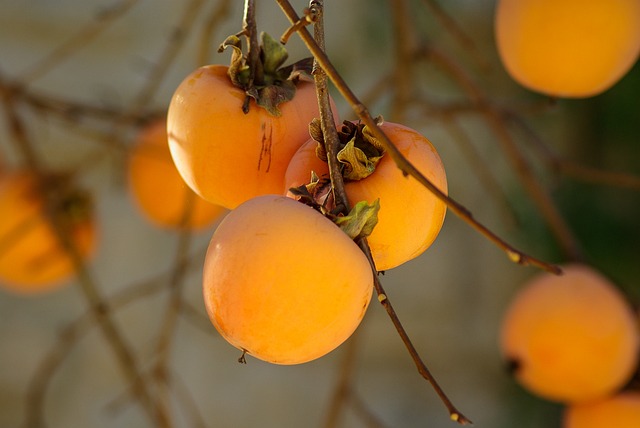Can you freeze persimmons? Yes, freezing persimmons can increase their life by up to 90 days. Unlike some other fruits, persimmons freeze very well and do not change their flavor or texture even after months.
Can Persimmons Be Frozen?
Persimmons are delicious and nutritious fruit that is enjoyed by many people around the world. They are known for their sweet and slightly tangy flavor and can be eaten raw or cooked. However, like many fruits, persimmons have a limited shelf life, and it’s not always possible to consume them all before they go bad. This is where freezing persimmons come in as a great solution. Freezing persimmons is a simple and effective way to preserve them for later use and can help to extend their shelf life.
How to Properly Freeze Persimmons?
Before freezing persimmons, it is important to select the right type of persimmon. There are two main types of persimmons: astringent and non-astringent. Astringent persimmons, such as the Hachiya, have high levels of tannins, which can make them very astringent and inedible if they are not fully ripe. On the other hand, non-astringent persimmons, like the Fuyu, can be eaten when they are still firm and don’t need to be fully ripe.
Once you have selected the right type of persimmon, it’s important to wash and dry them thoroughly. This will ensure that they are clean and free of dirt or other contaminants that could affect their quality and flavor.
Next, cut the persimmons into slices or chunks, depending on how you plan to use them later. This will make it easier to thaw and use them later.
Place the persimmon slices or chunks in an airtight container or freezer bag. It’s essential to remove as much air as possible from the container or bag before sealing it. This will help to prevent freezer burn and keep your persimmons fresh for a longer time.
Label the container or bag with the date and type of fruit, this will help you to know how long they’ve been in the freezer and use them before they lose their quality.
How Long Can You Freeze Persimmons?
Persimmon is a delicious and nutritious fruit that can be enjoyed all year round by freezing them. Freezing persimmons is a great way to preserve them for later use and extend their shelf life. However, it’s important to know how long you can freeze persimmons to ensure that they retain their quality and flavor.
The shelf life of frozen persimmons depends on how they are stored and the type of persimmon. Astringent persimmons, such as the Hachiya, have a shorter shelf life than non-astringent persimmons, like the Fuyu.
When stored properly, frozen persimmons can last for up to 8-12 months in the freezer. However, it’s recommended to consume them within 6 months to ensure that they retain their quality and flavor. To determine if your frozen persimmons are still good, check for any signs of freezer burn or discoloration. If they show any of these signs, it’s best to discard them.
It’s important to note that freezing persimmons can also change their texture, making them softer and less firm. This is a normal result of freezing and won’t affect the taste or quality of the fruit. When thawed, the persimmons will be softer, but still edible.
To ensure that your frozen persimmons last as long as possible, it’s important to store them properly. This means using airtight containers or freezer bags and removing as much air as possible to prevent freezer burn. It’s also important to label the containers or bags with the date and type of fruit, this will help you to know how long they’ve been in the freezer and use them before they lose their quality.
Can You Freeze Hachiya Persimmons?
Hachiya persimmons, also known as astringent persimmons, are tasty and nutritious fruits that can be enjoyed all year round by freezing them. However, it’s important to know how to properly freeze Hachiya persimmons to ensure that they retain their quality and flavor.
Hachiya persimmons are known for their high levels of tannins, which can make them very astringent and inedible if they are not fully ripe. When fully ripe, the tannin levels decrease and the skin becomes edible. It’s important to wait until the persimmons are fully ripe before freezing them. This can be determined by checking the fruit’s color, it should be dark orange, and the skin should be soft to the touch.
To freeze Hachiya persimmons, first, wash and dry them thoroughly. Then, cut them into slices or chunks, depending on how you plan to use them later. Place the persimmon slices or chunks in an airtight container or freezer bag and remove as much air as possible. This will help to prevent freezer burn and keep your persimmons fresh for a longer time.
Can You Freeze Persimmon Pudding?
Persimmon pudding is a traditional dessert that is enjoyed by many people during the fall and winter months. It is made from ripe persimmons, sugar, and various other ingredients, such as flour, eggs, and spices. The pudding is typically baked in the oven, but it can also be made on the stovetop.
One great advantage of persimmon pudding is that it can be frozen, making it a convenient and delicious treat that can be enjoyed all year round. Freezing persimmon pudding is a great way to extend its shelf life and enjoy it whenever you want.
To freeze persimmon pudding, first, make sure that the pudding is completely cooled down before placing it in the freezer. Once cooled, you can portion it into individual servings, or leave it in one big container.
Then, place the pudding in an airtight container or freezer bag and remove as much air as possible. This will help to prevent freezer burn and keep your pudding fresh for a longer period. Label the container or bag with the date and the name of the pudding, this will help you to know how long it’s been in the freezer and use it before it loses its quality.
When ready to enjoy your frozen persimmon pudding, simply take it out of the freezer and thaw it in the refrigerator for several hours or overnight. You can also thaw it in the microwave for a few minutes on a low setting. Once thawed, you can reheat it in the oven or on the stovetop before serving.
It’s important to note that freezing persimmon pudding can change its texture, making it less firm than when it was freshly made. This is a normal result of freezing and won’t affect the taste or quality
How Do You Use Frozen Persimmons?
Once your persimmons are frozen, you can use them in a variety of ways. Frozen persimmons can be used in smoothies, sorbets, and ice creams, adding a delicious and healthy twist to your favorite frozen treats. They can also be used in baking, such as cakes, bread, and muffins, adding a unique and delicious flavor. Persimmons can also be used in soups, stews, and curries, adding a touch of sweetness and depth of flavor to your dishes.
Another great advantage of freezing persimmons is that it can help to reduce the tannins in the fruit. Tannins are compounds that are responsible for the astringent taste of unripe persimmons. By freezing persimmons, the tannins are broken down, making the fruit sweeter and less astringent. This means that even if you have some unripe persimmons that you were not able to eat before they went bad, you can still enjoy them later by freezing them and thawing them when you’re ready to use them.
It’s important to note that freezing persimmons can also change their texture, making them softer and less firm. This is a normal result of freezing and won’t affect the taste or quality of the fruit. When thawed, the persimmons will be softer, but still edible.
Also Read: Can You Over Boil An Egg? Is It Safe For Health?
Frequently Asked Questions
What is the best way to freeze persimmons?
The best way to freeze persimmons is to puree the pulp. You should also add 1/8 teaspoon of ascorbic acid to each container with the persimmon. Try to use only a freezer container or canning jar. Leave enough space between the jars as well.
How do you preserve fresh persimmons?
Keep persimmons at room temperature and allow them to ripe. Put them in a freezer bag once they are fully ripe. Put the bag in the crispier part of the freezer but do not close it. You can also use a loosely covered bowl to store persimmons.
What to do with lots of persimmons?
You can do a lot of things with your persimmons. You can use them in your next smoothie, use them as a seasoning for your cereals, slice them into a salad, and use them as a snack or for backing.
Final Thoughts
In conclusion, freezing persimmons is a great way to preserve them for later use and extend their shelf life. It’s important to select the right type of persimmon, either astringent or non-astringent, and freeze them properly by cutting them into slices or chunks, placing them in an airtight container or freezer bag, and removing as much air as possible. Additionally, freezing persimmons can help to reduce the tannins in the fruit, making them sweeter and less astringent, which means that you can enjoy them even if they are not fully ripe.

